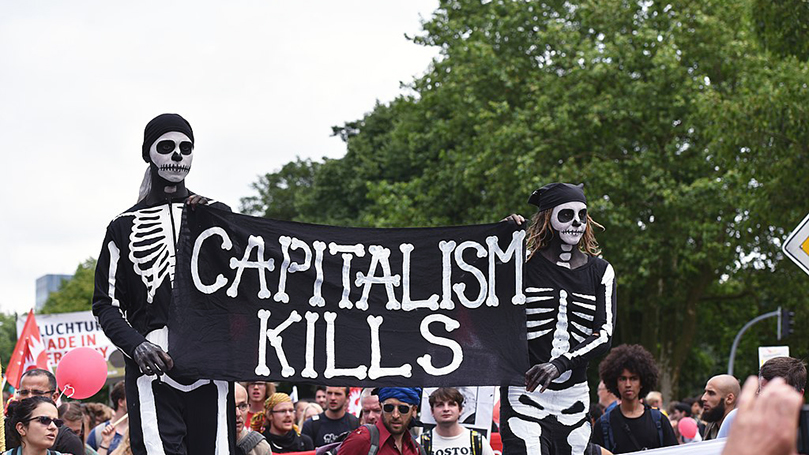
The country is in the midst of a socialist moment. Now that might strike folks as odd. Some might wonder: “Aren’t we supposed to be in an anti-extreme right moment, a time of resistance and rebellion against Trump?
And that’s true: we are indeed living through such a time when tens if not hundreds of millions have taken such a stance.
But consider that political moments are not things unto themselves, that moments and indeed movements, coincide, conflict, and contradict one another.
The big event that in many ways placed us where we are today – I’m talking about the Great Recession – was such a moment. In many ways it was both an all-peoples as well as anti-monopoly moment, as borne out by the Obama mass movement and Occupy respectively. The former opposed Bush’s extreme right policies, the latter rose up against Wall Street.
Today, we are not in the midst of an economic crisis, but who would deny the political crisis that weekly if not daily surrounds, the Trump administration? There’s an ongoing attack against the edifice of the capitalist state, the press, and a profound crisis of confidence in government.
We know from polls that socialist sentiment existed during all of these phases. It was a feature of Occupy and preceded Sanders famous race for the presidency, who built on it creating for first time a veritable buzz around the socialist idea (democratic socialist in his estimation) making socialism almost a household word. As a result in 2015-2016 a full-blown socialist moment arrived.
Socialism was discussed in the press, in church, in workplaces, barbershops, and campuses. It had a hard class struggle edge, too hard in the opinion of some, as the one percent and “the establishment” was railed against in the primaries. Socialism was identified with a string progressive policies, free university education, Medicare-for all, expanding Social Security. But it was also a little more than that: the concept began to be associated with its systemic features.
This was particularly evident among millennials, African Americans and Latinos, within whom socialism polled highest.
We welcomed these developments with the caution that socialist sentiment had grown in magnitude, “as people understood it.”
The country has arrived at another such moment. While bubbling and building since Trump’s election, this socialist moment exploded onto the national scene with AOC’s election in November along with a number of other federal, state and local officials, most recently in Chicago’s Board of Aldrman, in St. Louis in Tony Pecinovsky’s wonderful campaign and in a small town in Wisconsin, where our own Wahsayah Whitebird was elected to the City Council.
Socialism is being debated across the length and breadth of the country. Major outlets like the NY Times, and the Washington Post, are running series of articles and videos on the subject. It’s discussed on late night, on cable news shows. It’s presented as democratic socialism, state socialism, cooperative socialism, “command economy” socialism, Stalin socialism, market socialism. Why the Post even had an article on Eisenhowerian socialism.
There are literally hundreds if not thousands of articles on the subject.
This socialist moment exists alongside, is related to and in all likelihood is growing out of the resistance to Trump. And it’s also related to the deeper crisis of everyday living. Let’s recall that radicalization is an objective process. It’s a process that is mad at the banks, stagnant wages, student debt, the ever wars in the Middle East, the raw racism and sexism, the Islamophobia, anti-Semitism and homophobia let loose in the land.
It’s not neat, it’s not pretty, it’s not targeted as we would like against the extreme right. It oftentimes blames corporate Democrats, equally with corporate Republicans. To the degree that it reflects the sentiments of white youth it is at times one-sided, sexist, racially insensitive misrepresenting the equality aspirations of people of color, women and LGBTQ people, dismissing them as “identity politics.”
This sentiment can also be narrow, sectarian, nostalgic about about a lost past, romantic, adventurist, and distrustful of electoral politics. It is coming to socialism, to Marxism in a very one-sided and mutilated way.
But with all of that it’s simply huge. It’s independent and is encompassing millions of young people. And it’s working class.
So you’ve got this huge conversation taking place about this huge movement that’s unfolding. There’s only one thing missing: us.
We’d do well to ponder why? Is the source of the problem, a belief that the growth of socialist sentiment is a detraction from broad unity against the right?
Or could the problem lie in another area, a more general lack of party initiative in sparking debates, movements, activities guided by the notion that such action is inherently sectarian leading to dead ends?
What about the concept that our focus should be on movement building, on aiding the creation of a united front, that now in fact is not a time for building the party?
If not this then, perhaps the problem is the notion a focus on the issues that unite is the order of the day, and since socialism does not unite, we leave it aside for now.
Or maybe it’s none of the above, and that we’re just overwhelmed, understaffed, that we have to prioritize, do what we can, and the right danger is greatest and let’s leave the rest to God.
While not full blown elements of these factors are affecting our work.
For example, take the Sander’s bid for the presidency. Could his manner of presenting the issue be affecting how and whether we treat the socialist tendency?
Or take the question of how we’re placing the question of the need to focus on issues: that such a focus will build the greatest unity in the fight against Trump.
But isn’t it the case the case that it is precisely issues like the “Green New Deal” and “Medicare for all” that are being used as wedge issues and branded by the extreme right as socialist?
Trump as we know used his State of the Union address to launch his anti-socialist red-baiting drive by declaring “We will never be a socialist country.”
He soon followed up with his speech in south Florida on Venezuela in which he repeated the never-socialism pledge. This was soon followed up by House and Senate GOP members of Congress in attacking the Green New Deal and Medicare for all.
Mitch McConnell, the Senate Majority leader, framed the issue several days ago for the 2020 election cycle, framing the GOP as a “firewall against socialism.” By the way, he includes, getting rid of the Electoral College and expanding the Supreme Court as among the Democrat’s red-inspired ills. This is important: electoral reform is on the horizon and they’re scared of it.
So there you have it: this is socialism “as they understand it.”
Here I want to pause for a moment and address this concept of “socialism as they understand it” that we’re very fond of using when addressing the rise of socialist consciousness. Unless I’m mistaken the thought behind the phrase is that what’s considered socialist in the popular imagination is really not, or is at best, social democracy and that we the communists, know what real socialism is.
Could approaching the issue this way be a little dismissive, a negative, a put down? Why not view these popular concepts of socialism as a positive, a step up and and an opportunity?
Workers come to socialism both on the basis of experience from struggle and ideas, on the basis of issues and the concepts that lie behind them. So instead of a general attack on social democracy, it might make more sense to say, “yes, that’s a good step forward, now let’s take it further.”
Now it’s beyond doubt that there’s an anti-communist impulse behind the anti-socialist drive: behind it is the critique of what we’ve called “real existing socialism.” Behind that of course is charges of “socialism has failed everywhere it’s been tried, the 100 million dead Big Lie, along with the real problems of democracy and violations of socialist democracy under Stalin etc.
How should we deal it? I noticed that Sanders addressed this problem very deftly recently. When asked at the Fox Town Hall if socialism wasn’t negative he simply said, “Democratic socialism to me is creating a government and an economy and a society that works for all rather than the top 1 percent”. And then he moved on.
Interesting. He didn’t dwell on it. He returned to focusing on the issues and how they would work for working-class people. On the other hand: I watched Trump’s economic advisor in an interview just salivating on wanting to focus on defining socialism as a command economy, gulags etc.
What’s at stake here? First we have to understand that the anti-communist impulse is largely generational. Sanders get’s that even as he gives in to it at times. On the other hand, Trump and Co, and I have to say some of the Democratic leadership, are addressing it the old school way.
But there’s a new generation that’s arising which sees things differently. This point of view is expressed by “Mayor Pete” a rising Democratic contender who argues the issue in the following way:
“The President is adopting a tactic that takes us back to the darkest days of the ’50s when you could use the word ‘socialist’ to kill somebody’s career, or to kill an idea, but that trick has been tried so many times that I think it’s losing all meaning,”
In another interview, I believe on Morning Joe, he made a kind of post-ideological argument that the approach should be to reject labels and access programs on whether or not they work.
The point that’s being made here is that these issues are in motion and that thought patterns are changing, particularly among the young.
So how should we respond? In my opinion, vigorously, loudly, enthusiastically, in a partisan, working-class, militant way.
In the year of our 100th anniversary we should defend socialism as working-class led society that benefits everybody and stick to the issues.
When asked about whether socialism is a negative, we can argue proudly that we are for a socialism based on the Bill of Rights and stick to the issues.
When pressed about developments other countries we can be both partisan regarding the strengths but also partisan in critiquing the faults.
We have to do this while emphasizing that U.S. socialism will not be a foreign import but one based on our own traditions, history and the emerging sensibilities of the U.S. public and that includes the institutions of political power, the state and government.
We’re not going backwards to socialism but forward to a socialism 2.0, a working-class led majoritarian movement of class struggle that favors the expansion of democracy in every direction. What forms it will take are hard to predict. Take the issue of state power. What will it look like? Who knows? I have my doubts as to whether the forms of governance that exist today, will obtain in a socialist tomorrow. Occupy was suggestive of that.
Or take the structure of the economy. Many eco-socialist and eco-feminist theorists are calling for new models of sustainable socialism, emphasizing small-scale circular economies, rejecting concepts of growth as presently defined.
But whatever the case: we’ve got to be in it to win it. We’ve got to join the debate.
Image: Wikepedia
.
Editor’s Note: The content here was presented to the National Board of the Communist Party on April 14th.


 Join Now
Join Now